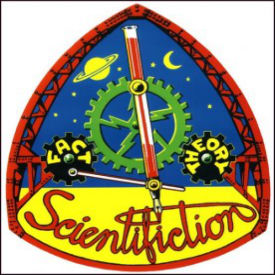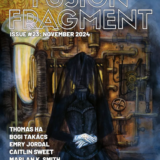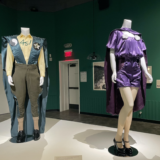There are a lot of interesting offerings for science fiction readers this month, though I didn’t make as big a dent in my reading pile as I’d like. As a result, I’m only talking about six books: three of them space operas; one a retro tale set in the mid-sixties; a road trip across a “nanotech Western” landscape, and a collection of robot tales. What I found really interesting was the way certain themes kept cropping up.

Fans of space adventures set nearby, like The Expanse, have two tales exploring the role of an organization like the Coast Guard in Pale Light in the Black by veteran author K.B. Wagers, and Sixteenth Watch, a debut novel by Coast Guard veteran, Myke Cole. Both books share a surprising number of plot points, but they come at them from very different angles and I’m happy to recommend them both. Another odd couple can be found in Our Child of the Stars, Stephen Cox’s novel about an alien child and the family that takes him in, and The Last Human, Zack Jordan’s space opera that opens with a human child being raised by an alien predator and goes on to a mind-blowing conclusion. Both debut novels and both highly recommended. Editor Jonathan Stratan has done many notable collections, and here’s one more you shouldn’t miss – Made To Order: Robots and Revolution. The authors he’s engaged to contribute are the best we’ve got writing, and the result is exactly what science fiction should be: entertaining and thought-provoking.
Last, but certainly not least, there’s Anthropocene Rag a thoroughly enjoyable post-apocalyptic road trip through an America reformed by AIs and nanotech. Weird, but not so much so that it gets in the way of the story. I liked it a lot.
Beyond that, you’ll find the list of books I really wanted to get to…but didn’t…filed under Other Recommendations and links to what other reviewers came up with in my Usual Suspects section.
Novels and Novellas (in order of publication)
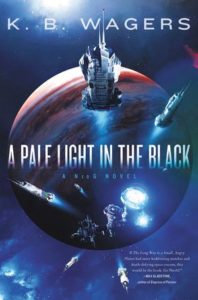 A Pale Light in the Black by K. B. Wagers 3/3/2020 HarperCollins Publishers
A Pale Light in the Black by K. B. Wagers 3/3/2020 HarperCollins Publishers
K, B. Wagers starts a new series, currently planned for two books and an option, with a coming-of-age in an Expanse -type setting where the tension is between competing Earth services NeoG(Coast Guard) and Navy. A young LT who broke away from her wealthy family finds herself dragged into their business when it becomes the business of the Near-Earth Orbital Guard. It’s a pretty good read, and a good contrast to the other Coast-Guard-in-space story this month, Sixteenth Watch, which addresses a lot of the same issues, but from a different point of view.
The NeoG does all the dirty work and the Navy gets all the glory but if a Coast Guard team can only win the wildly-popular Boarding Games, a sort of Olympics for the military services, maybe public opinion shift to get them some critically-needed equipment and repairs. So it leaves everyone puzzled when the Admiral in command of the NeoG deposits a fresh LT in NeoG’s best crew/team, sending their top fighter off to a distant post so that she can put LT Maxine Carmichael, fresh out of Interceptor training, where she wants her.
Max chose the Guard over her family’s traditional Navy career path (or having anything to do the massive fortune that her grandfather’s tightly-controlled longevity treatment brings her family) but she finds out that you can run, but you can’t hide: her family’s status and her native ability keep putting her in the thick of things.
Max may be green, but she’s a fast learner, and between her knowledge of family politics and innate pattern-matching ability, she’s just what Zuma’s Ghost needs to get the job done. Not that settling into a tight-knit crew is a cakewalk, especially when you’ve displaced their star player and a critical set of games is coming all too soon.
I kept thinking that one thing or another was too improbable, but time and again, the author made me realize that it’s not about luck, it’s about the forces in play, a theme that comes up in several books this month. A Pale Light in the Black is a great romp and the first of (at least) a two-book series, so we’ll look forward to the next chapter in Max’s saga.
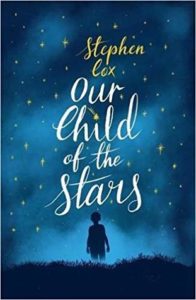 Our Child of the Stars by Stephen Cox 3/3/2020 Mobius
Our Child of the Stars by Stephen Cox 3/3/2020 Mobius
When a meteor crashes near an upstate New York town in the 60s, things get strange.
Molly is a nurse at the small hospital, and she’s just getting over losing a baby and dragging herself back from alcoholism when the meteor falls on the town of Amber Grove. Nothing would ever be the same again. The meteor fragmented as it fell, and though it largely missed the town, there were plenty of casualties. When the head nurse taps Molly to help with a special case, her world shifts on its axis.
The special case is, as you already knew from the title, an alien child. How alien? I’ll leave that to the author to show you at the end of the first chapter. It’s beautifully handled, and Molly is hooked, dedicating herself to adopting “Cory”, keeping his existence secret from everyone, especially the Nixon administration’s scientists…yes, it’s set in the sixties around the time of Woodstock, and continues through the moon landing. It’s a fascinating look at that period and a solid work of science fiction that never loses sight of its emotional core. It’s powerful stuff. I hope this gets read by science fiction readers and by those who haven’t yet realized they like the genre, and enjoyed by all.
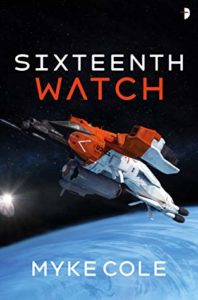 Sixteenth Watch by Myke Cole 3/10/2020 Angry Robot
Sixteenth Watch by Myke Cole 3/10/2020 Angry Robot
The US Coast Guard is charged with law enforcement “over the high seas and waters subject to the jurisdiction of the United States.” In his first book, author and former Coastie Myke Cole takes the “high seas” part literally and includes the high frontier, from Low Earth Orbit to Lunar space. On the moon, Chinese and U.S. interests are clashing, largely over the H3 deposits. The Navy, beloved of the administration, sees this as a war zone and their business, but the Coast Guard believes that if you treat something like a war, you get a war….but if you treat it as law enforcement, you’re more likely to get law and order instead of a war that could easily escalate back home.
Slated to come out just after you’ve had a chance to read A Pale Light in the Black, the other Coast-Guard-in -space novel out this month, you’ll find a lot to compare and contrast between the to books. For one thing, they both feature a Navy / Coast Guard rivalry and an intra-service competition called the “Boarding Games.” What’s interesting is that A Pale Light in the Black is about an officer just starting out, and Sixteenth Watch features one about to retire. Both are quite good.
Cole has worked hard to get both the science and the story right, and while his high seas experience doesn’t make a perfect match for space and lunar ops, it’s a good effort and a good story. Sixteenth Watch opens with a skirmish between Chinese and American H3 miners in which the captain of a Coast Guard SAR team has to watch her husband, who happens to be Captain of the Navy’s response to the incident, be killed by the Chinese. “Widow Jane,” the nickname she’s gotten in the Service, was happy to rotate back to Earth and run the Boarding Action training, but the Commandant of the Coast Guard asks her to go back into the black to train the Guard’s competing team for the upcoming Boarding Games, and (incidentally) take command of the Guard.
Jane puts off retirement to go back and try to heal both her wounds and those of the crew she left behind. And maybe keep a war from starting…if she doesn’t start one with the Navy, who thinks the high frontier is their turf, but doesn’t mind having the Coast Guard around as long as it keeps its job to checking life-preservers and towing broken ships home.
Somehow I don’t think the Navy counts on the determination a Coastie brings to the mission.
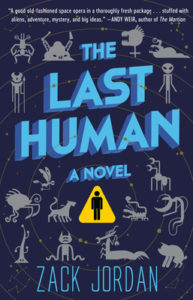 The Last Human by Zack Jordan 3/24/2020 Ballantine
The Last Human by Zack Jordan 3/24/2020 Ballantine
“The Last Human” is a wonderful debut by Zack Jordan. Space Opera, coming of age story, a case for and against human exceptionalism, levels of intelligence, and the illusion of chance are all wrapped up in a fascinating romp. This book sneaks up on you. It starts out as a coming-of-age human diaspora story and ends up blowing your mind.
This is another interesting case of parallels, like the two Coast Guard in Space novels. If Our Child of the Stars is about an alien adopted by a human, The Last Human turns the trope on its head: in it, an alien has adopted a human child, keeping her identity secret from the government (or, in this case, the overarching high-level intelligence that permeates the network that is both internet and wormhole highway to the galaxy). Why is Sarya the Daughter the last human? Because humanity didn’t play well with others when it was offered the chance to join The Life Interstellar, which was, I’m pretty sure, the original title of the book when it won a Nerdist competition for new space operas in 2016.
Being raised by what appears to be a giant black widow spider with razor blades on every limb might be just what Sarya needs to survive out in a galaxy that shudders at the thought of a human still on the loose. It also might be just what the galaxy needs to save it from a greater threat than its network-coddled worlds can imagine. What are the odds? Actually, one of the things that this brilliant book does well is to show that there are no odds.
The Last Human is full of great characters and thoughtful ideas. I’m torn between wanting a sequel and the fear it wouldn’t be this good, because…how could it?
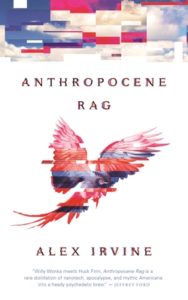 Anthropocene Rag by Alex Irvine 3/31/2020 Tor/Forge
Anthropocene Rag by Alex Irvine 3/31/2020 Tor/Forge
There’s a lot going on in this western mythos infused post-singularity-apocalypse-nanotech-travelogue. And it’s all good. Anthropocene Rag gives a new spin to each of those genres, putting them in a blender to come out with something interesting and unique, and because it’s Alex Irvine writing it, it’s fun to read too.
After AIs emerge and rewrite America with nanotech, it’s as though the inside of our collective heads is now on the outside, walking around in fluid instances from dinosaurs to grizzled 49’s panning for truth. The latter of those is Ed, an AI who gathers up a team of humans from the corners of the wasted and recreated America to seek out the legendary Monument City somewhere out west and to get a handle on what it all means.
It’s a quest for knowledge, it’s a road trip through a mutable vision of what America is/was/could be. Anthropocene Rag is what you might get if American Gods were science fiction, or if Jeffrey Ford could just be a little less Wyrd and a little more readable. That Alex Irvine can craft a story that’s both interesting and enjoyable speaks to his work on media tie-ins, but this shows that he’s more than capable of imagining worlds worth exploring on his own.
Collections, Anthologies, and Novellas
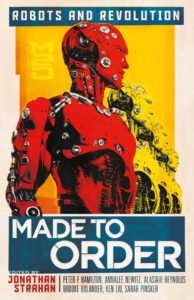 Made To Order: Robots and Revolution Edited by Jonathan Strahan 3/17/2020 Rebellion
Made To Order: Robots and Revolution Edited by Jonathan Strahan 3/17/2020 Rebellion
I often talk about science fiction as a conversation, and while his wasn’t the first voice, Asimov’s contributions remain the most influential in the genre. Also, he was born 100 years ago this year, so a robot anthology seems, well, Made To Order, and with it, Strathan has added significantly to the conversation (BTW…).
Editor Jonathan Strahan has assembled the A-Team of contemporary science fiction writers to add to that conversation, and they’ve all got something interesting to contribute. Robots have been stand-ins for slaves, oppressed workers, and other people without agency since Karel Čapek wrote R.U.R, the play where he gave us the word “robot” back in 1920, which I’ve already noted was the year Issac Asimov was born.
In this collection of new stories, robots still play the role of representation, but now they’re representing their not-so-distant future selves in the mix, and the question When will robots be human? turns out to be When we treat them as badly as we treat everyone else. Sometimes things go better for us (or them), sometimes worse, but it’s a new sort of Turing test that these stories pass easily. The authors who contributed are among the best thought experimenters writing today, including Peter Watts, Daryl Gregory, Ian R. MacLeod , Annalee Newitz and more (including one of my favorite new writers, Sarah Pinkser). It’s a diverse and well-rounded group, and my only regret is that Martha Wells (The Murderbot Diaries) isn’t included.
The stories are universally excellent, but you shouldn’t miss Strathan’s introduction, which does a very good job of looking back over the genre and pointing the way forward.
Note: By the way, Asimov’s first sale was to this magazine, with Marooned off Vesta, which appeared in the March 1939 issue.
- Otaku by Chris Kluwe 3/3/2020 Tor/Forge
- Vulcan’s Forge by Robert Mitchell Evans 3/26/2020 Flame Tree Press
- Anthropocene Rag by Alex Irvine 3/31/2020 Tor/Forge
- Docile by K.M. Szpara 3/3/2020 Tor/Forge
- Providence by Max Barry 3/31/2020 Putnam
- The Companions by Katie M. Flynn 3/3/2020 Gallery
Since I’m often done with this after the beginning of the month, I do check what I consider to be the usual suspects, but mainly to see if they agree with my picks, which oddly enough, they more or less do. You might check them out at:
- Locus Magazine (online): Forthcoming Books
- Nerd Daily: March 2020 Book Releases
- Polygon: 20 new science fiction and fantasy books to check out in March
- SyFy WIre: Eight YA Sci-Fi and Fantasy Novels to Pick Up This March
- Tor.com: All the New Science Fiction Books Arriving in March!
- Amazon.com: Editor’s Picks – Best Books of the Month: Science Fiction & Fantasy
- Barnes & Noble: The Best Sci-Fi & Fantasy Books of the Month
About the Reviewer’s Pics:
For the most part, this list sticks to what appeals to me as science fiction, about which I’m willing to be fairly flexible, but if here there be dragons, you can expect to find some tweaked DNA to explain it. I make up this list based on what I’ve read, what I heard and what I’m looking forward to. Quite a few will wind up getting full-length reviews here or around the web, especially at SFRevu.com where I’m editor emeritus. Please note that these are my selections, and do not represent the opinions of the editor or publication.
You can find me on Facebook at @Ernest Lilley or on my blog @ beingErnest





